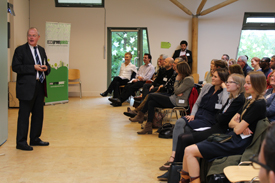Yesterday the Jump (Green Rewards) team were out in force for our big event, bringing together local councils, companies and strategic authorities to discuss how behaviour change tools can help their organisations engage residents and employees in positive steps to boost sustainability and wellbeing.
Using the hashtag #BCS2014 we tweeted our way through the morning’s proceedings as our speakers covered a range of topics – from ‘smart people’ and the importance of wellbeing through to case studies on both JUMP and Local Green Points schemes.
The event took place at the LookOut, a unique eco-themed venue in the middle of Hyde Park, and was attended by over 60 delegates who took in the morning’s proceeding over coffee (and biscuits!)
Presenting at the event were John Twitchen, Executive Director of Copper Consultancy; Lawrence Mitchell, Marketing Director and Well-Being Champion for RBI; Kate Cathie, Environment and Sustainable Development Co-ordinator at the University of Chichester; and Stephen Didsbury, Head of Waste and Street Services at the London Borough of Bexley; and Graham Simmonds, Green Rewards’ Managing Director.
Opening proceedings, Graham Simmonds highlighted how we could learn from organisations such as Unilever, who have developed the ‘five levers of change’ model to drive pro-sustainable behaviours amongst consumers.
John Twitchen talked about ‘smart people’, setting his focus firmly on people and argued that we need to invest more in revenue expenditure and not just capital expenditure on facilities and equipment.
Lawrence Mitchell explored the relationship between sustainability and well-being, highlighting that environmental wellbeing should be a part of a wider well-being strategy. He outlined the benefits to employers in having a robust well-being strategy and joined-up activities, including reducing absenteeism by around 26% (Wellness Council of America) as well as reducing stress and increasing engagement of employees.
Kate Cathie spoke of the progress that the University of Chichester has made in making their organisation more sustainable, including the creation and implementation of their own JUMP programme. She highlighted the benefits of the flexible programme, which fits well with previous sustainability ventures, creating continuity.
Stephen Didsbury explored the impact that the London Green Points – Bexley scheme has had on recycling rates in the Borough and the lessons learnt from the scheme – such as the importance of a door to door campaign and the value of the London Green Points – Bexley champions promoting the scheme within their own communities.
Graham Simmonds closed the event with a look back at some of the achievements of the past 12 months for Green Rewards, including how we’ve involved over 175,000 participants in a range of behaviour change activities covering energy, waste and recycling, walking, personal wellbeing, cycling, new ideas and volunteering for charities.
Graham also announced the launch by Jump (Green Rewards) of a new Local Rewards app – coming soon to iOS for all our Local Green Points participants. If you’re a member of one of our schemes, keep an eye on your inbox for the latest news!



